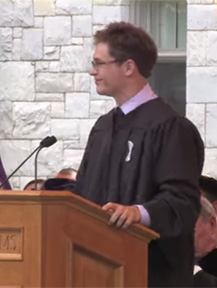By Madeline Vuong
It’s hard to become high school valedictorian. It’s even harder to become college valedictorian. But according to Ivan Badinsky (ΦBK, Williams College, 2014), who’s been both, the hardest thing to become is a person who leads a valuable life in the world after grades.
“It’s so flattering when people come up to congratulate me [on graduating as the valedictorian of the Class of 2014 at Williams College]. But I wonder whether it matters the way they seem to think it does – whether it predicts anything about my life in the future. People are like, ‘You’re set!’ And I’m thinking in my head, ‘Sure, I’ve done well at college, but does that mean I’ll go on to lead a valuable life? What would a valuable life even be?’” Badinsky said. “I’ve spent a lot of time reflecting on it.”
In addition to being the class valedictorian, Badinsky was also this year’s president of the college’s Phi Beta Kappa chapter. He gave a farewell speech to the Phi Beta Kappa members, in which he broke free of the typical graduation speech that prescribes some course of action guaranteed to make graduates’ lives better – say, to have fun, or to contribute to society, or to remember to “check your privilege.” Instead, his speech was made up of mostly questions, for which he said he didn’t have answers.
“It’s just been on my mind a lot, these questions of what should we do with our education,” Badinsky said. “Is it just a way to a diploma? To a high-paying job? To knowing how to treat others well? What has our education all been for? And what should we be doing, now that we’re going out into the world?”
Badinsky wound up arguing that there is no “should” that applies to everyone. For him, all value is contingent – so what matters must be determined by each individual for him or herself. That said, Badinsky does think that education can help everyone to figure out his or her own “should.” So if there’s any universal “should” regarding our education, it’s that we should use it to figure out how we want to live in the future.
“Part of finding our place in the world is defining what has value and what does not. And education isn’t the answer to that, it’s the means for finding answers. There aren’t these set, objective things that you can read in a textbook, that, then, if you learn them and go out and do them, will make your life have value because you’ve been properly educated. Or at least I’m not enough of an objectivist to think that there are,” Badinsky said.
While not an objectivist, Badinsky was, perhaps unsurprisingly, a philosophy major. “I definitely didn’t come into college knowing I liked philosophy,” he said. “Actually, when I first heard about philosophy, I thought it would be boring – all obscure terminology and dead guys and famous quotes. But now I think it’s the most practical of the disciplines because all fields of study ultimately try to get at how people should live their lives and what matters in those lives. Philosophy just asks more directly.”
Perhaps more surprising, then, is that Badinsky also majored in economics. “I always say that I do economics because it offers such useful tools for understanding the world, but I do philosophy for the soul,” Badinsky said, with a sheepish smile. “I want the economic tools to think about things, but I don’t want to forget why I’m using the tools in the first place, and why it matters to be thinking. That’s why I need both in my life.”
In his farewell speech, Badinsky referenced his dual majors, saying that the thing he most appreciated about being a part of Phi Beta Kappa is that it is an organization that realizes the role that education across diverse discipline plays in helping individuals answer the many questions they have about how to live well.
“Phi Beta Kappa honors excellence in all types of study. But this doesn’t mean that [the society] is about education for education’s sake. Instead, through lectures, public debates, and community engagement, Phi Beta Kappa is a place for people to share what we have learned, in its many different forms, and then to ask what is valuable from that.”
Because Badinsky is a native of Bulgaria, he will have to return to Bulgaria at the end of next year unless he applies for citizenship. “The only way to keep living in the US was to work, so I accepted a position with AG [Analysis Group—a Boston-based economic consulting agency] as my first job after graduation. I asked myself a lot of questions about that too—about whether it was the right choice to stay here another year, about what job I wanted…”
After a thoughtful pause, he continued. “I think working will be very different from school. And I think my life will be even more different once I go back to Bulgaria…But I’m excited to start something new and to spend some time defining my life—and my self—outside of school.”
Madeline Vuong is a recent graduate of Williams College in English and Women’s, Gender, and Sexuality Studies. She became a member of Phi Beta Kappa in junior year. Williams College is home to the Gamma of Massachusetts Chapter of Phi Beta Kappa.
Photo at top: Ivan Badinsky delivering his valedictorian address at Williams College’s 2014 commencement.




